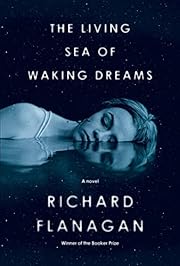

Click on a thumbnail to go to Google Books.
|
Loading... The Living Sea of Waking Dreams (2020)by Richard Flanagan
 None No current Talk conversations about this book. “It wasn’t enough for Terzo that their mother had not died. It wasn’t enough that she lived in her sea of waking dreams. In Terzo’s view, she had to live like us, rationally, in a rational universe. And as there was to be no death, nor could there be any other life.” Eighty-seven-year-old Francie is in a Tasmanian hospital. Her health is declining. Her three adult children, Anna, Terzo, and Tommy, decide to keep her alive as long as possible, requiring ever-increasing efforts. Anna, the primary character, experiences vanishing body parts, as if she is being erased, and no one notices. The story is set against a backdrop of the recent Australian wildfires. This book portrays how guilt can negatively influence actions. The kids love their mother, so shouldn’t they do everything possible to keep her alive? Isn’t life better than death? Even when Francie begs to be “let go” they willfully misunderstand her. It raises the issue of quality of life. [Obviously, people currently dealing with these situations may want to avoid this book for now.] The author comments on how social media distracts people from addressing important matters: “The more things changed the harder people stared into their screens, living elsewhere, the real worlds now no more than a simulacrum of the screen world, their real lives the shadow of their online lives. The more people vanished the more they asserted themselves online as if in some grotesque equation or transfer.” It also provides commentary on the decline of the natural world and the importance of engaging in it. The writing is powerful. It is a sad story, and at times deeply disturbing, but definitely thought-provoking. no reviews | add a review
"From the author of the Booker Prize-winning The Narrow Road to the Deep North comes a wrenching novel of family, climate change, and the resilience of the human spirit--an elegy to our disappearing world. In a world of perennial fire and growing extinctions, Anna's aged mother is dying--if her three children would just allow it. Condemned by their pity to living, subjected to increasingly desperate medical interventions, she instead turns her focus to her hospital window, through which she escapes into visions of horror and delight. When Anna's finger vanishes and a few months later her knee disappears, Anna too feels the pull of the window. She begins to see that all around her others are similarly vanishing, though no one else notices. All Anna can do is keep her mother alive, stay the course that she and her brothers have set. But the window keeps opening wider, taking Anna and the reader ever deeper into an eerily gorgeous story about hope and love, hospital beds and orange-bellied parrots, beauty and solitude and regret. An ember storm of a novel, The Living Sea of Waking Dreams lays bare the interconnectedness of humans and the natural world, and makes an impassioned plea to avert our shared fate"-- No library descriptions found.
|
Current DiscussionsNonePopular covers
 Google Books — Loading... Google Books — Loading...GenresMelvil Decimal System (DDC)823.92Literature English & Old English literatures English fiction 1900- 2000-LC ClassificationRatingAverage: (3.73) (3.73)
Is this you?Become a LibraryThing Author. |
||||||||||||||||||||||||||||||||||||||||||||||||||||||||||||||||||||||||||||||||||||||||||||||||||||||||||||||||||||||||||||||||
Anna and her brother Terzo cannot give in to death when there is the possibility that their mother might survive, an utterly understandable sentiment taken to cruel extremes that ignore her wishes. Flanagan dissects this refusal to accept death and parallels it with refusal to accept that we cannot control the environment:
Flanagan captures the impossibility of understanding the world via the relentless bright fragments of social media rather well; this is something that novels don't often manage:
Although the novel is largely grounded in horribly realistic details, it includes a fantastical element of vanishing body parts. I found this the least powerful part. It didn't seem necessary to make this theme visually literal, given that the sense of loss and dread of individual and species death already pervading the entire book. I think [b:The Memory Police|37004370|The Memory Police|Yōko Ogawa|https://i.gr-assets.com/images/S/compressed.photo.goodreads.com/books/1544335119l/37004370._SY75_.jpg|7310932] used the vanishing conceit more adeptly. Nonetheless, I was impressed that [b:The Living Sea of Waking Dreams|54282408|The Living Sea of Waking Dreams|Richard Flanagan|https://i.gr-assets.com/images/S/compressed.photo.goodreads.com/books/1593219994l/54282408._SY75_.jpg|81442712] does something I wrote about in my review of [b:Dreamland|54970000|Dreamland|Rosa Rankin-Gee|https://i.gr-assets.com/images/S/compressed.photo.goodreads.com/books/1618159442l/54970000._SX50_.jpg|85740154]: confronts the reality of climate change via the reality of death. This works very well, making it a more powerful and frightening climate novel than others I've come across. It also makes for a stronger and more definite ending than the ambiguity of most such fiction I've read.
I don't think it's a coincidence that such a powerful climate change novel was written in Australia, given it is a wealthy Anglophone country seeing deadly extremes of heat and fire as the planet warms. Flanagan asks how much longer Australians, and humanity in general, can deny or fight the reality of this. [b:The Living Sea of Waking Dreams|54282408|The Living Sea of Waking Dreams|Richard Flanagan|https://i.gr-assets.com/images/S/compressed.photo.goodreads.com/books/1593219994l/54282408._SY75_.jpg|81442712] frightened me more than any other climate change novel of recent years, and for that I commend it. (